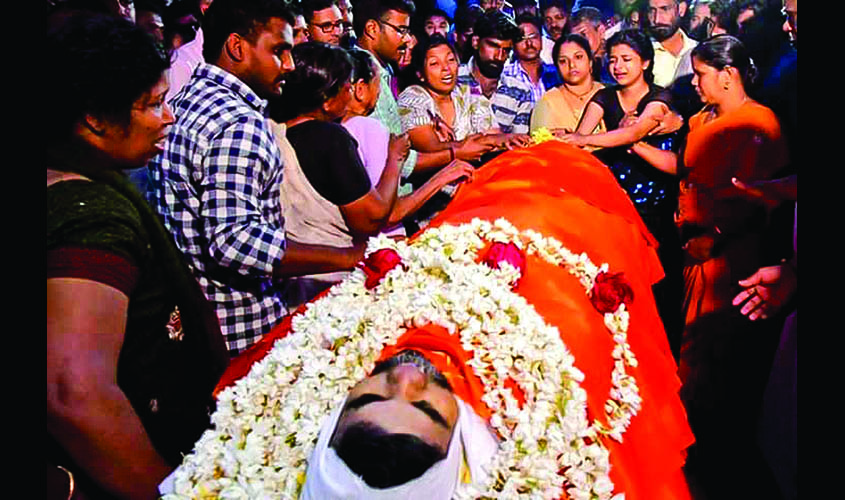
One of the little girls is on the cover of a book—the cover image catches a single tear rolling down her cheek. It might have been clicked when she saw the rubble where her house once stood, charred to the ground, or maybe the photo was taken as she looked down the well in her house that was now covered with hair waste from local barber shops, rendering the water unpotable. Or it could have even been the sight of her beloved bicycle that was crushed by the same brutal hands that demolished her home. But it’s a lasting image for a book (Aahuti) that tells the untold stories of BJP and RSS workers who have lost their lives and limbs over a 70-year period to CPM violence in Kerala. Sivada stands before me, a sprightly little girl, her hair pinned up, its oiled loose ends snaking down her narrow arched shoulders. She is related to the Chief Minister of Kerala, Pinarayi Vijayan; the comrades cannot be faulted for bowing down to nepotism, sharing the same blood with the most powerful man in the state does not mean it will not be shed. Besides the act of betrayal by the adults in her family, that of supporting the BJP has brought this upon them. The logic in Kannur runs something like this, fashioned into justification, the neighbours will sigh at the sight of their destroyed home, but opine privately and openly that they had it coming. Oppression creates its own dialect, to speak it and understand it, one must live it.

Those who call Kannur home, understand this language and the violence that is its subtext. Those on the outside, like the well-meaning man I met on the train on my return from Kannur, will tell me that “they” keep away from those parts. Who are the “they” and who are the “us”? The violent history of Kannur has “otherised” these victims in a state that prides itself on its civility and culture. But the violence is seeping out, scarring the landscape of God’s own country. A woman burnt to death along with two others inside her home in Pallakad. A Dalit leader from the BJP brutally beaten and blinded in one eye during a protest in Thiruvananthapuram. A mother dragged on the ground for protesting her son’s suicide. A senior college professor from Thiruvananthapuram again, surrounded and manhandled by SFI students for hours, not permitted to even go to the bathroom and made to hand over money for a college fest without being presented an account of expenses. Or most recently a CPI panchayat leader and his family attacked by their allies in government in Trichy. The violence is spreading.
But it is yet to reach Delhi, the enormity of it, the barbaric inhumanity of it. So they come here, the victims of this violence. A caravan of the macabre. They move from one meeting to another, seeking time, the photographs with the politicians, a talk with students. There is a mother amongst them, she has a lot to say. I don’t know why I introduce her as a mother, when she is also a widow, the same violence by the CPM snatched away both her husband and son, 14 years apart. Maybe I call her a mother because she ceased being one to that son only a few months ago. She doesn’t speak English or understand Hindi, she reaches out and clasps my hand, insisting we have met before, placing one shaky finger on my shoulder and nodding as she points it away from me and says Kerala. I tell her we haven’t. But it’s not entirely true, I have met her before, in Sujith’s mother.

Sujith, my first friend from Kannur. We were introduced a little over a year ago by his death. One dark night in February as the capital rumbled with the chants of right to free speech, he was denied the right to life. His screams fell silent on the ears that ricocheted with their own wordy moral righteousness. He was killed by a medieval instrument of torture, a plank of wood with nails embedded on it. It scraped the skin from the back of his neck down to his waist. His mother described it to me, two months later, between sobs asking for justice. Yes, I had met this Amma before, in another form. Now she stood before me as Remith’s mother. She told me her son’s killers walk by her house every day. Free. She wants justice as well. An activist friend once told me, every story, every person you will encounter will break your heart and they will be all that matter at that moment. And after a while, when it is this endemic violence, they will remind you of each other, intensifying your helplessness. And you will meet others until you stop or the violence stops.

And on some days, you want to stop and escape from the abuse, the violence of speech and thought it brings into your life. Retreat into your room and conjure up words that build a world of imagination that makes people, laugh, cry, delight and be entertained. A world that promises only fleeting emotions. But the blank page stares back at you, like those unseeing eyes of that man at the table with his beautiful little girl resting in his arms, a daughter he will never see. And you begin to tell the same story again with different characters.
Advaita Kala is an internationally published novelist and award winning screenwriter. She has written extensively on the violence in Kannur.

